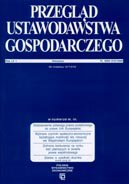Przegląd Ustawodawstwa Gospodarczego Nr 03/2008
Rok wydania: 2008
Miejsce wydania: Warszawa
Oprawa: miękka
W numerze:
Mariusz Fras
Regulacja prawna umowy ubezpieczenia w ustawodawstwie francuskim
The Insurance Contract Law In France
The development of insurance contract law in France has been punctuated by laws and decrees transposing the three generations of European directives establishing the single insurance market. The general regime of insurance contracts was provided for by Code des Assurances, which, since its adoption, has been subject to numerous legislative reforms in order to adapt its regulation to rapidly changing socio-economic background. Additional legal sources shaping French insurance law comprise of laws transposing directives related to insurance and vast scope of texts setting up a specific insurance scheme with respect to compulsory insurances. It should be then concluded that legal framework of insurance law in France, due to its abundance, makes it impossible to present all its essential features in an exhaustive manner within one publication. Thus, the aim of this article is to briefly introduce the general outline of the contract of insurance under French law and to selectively describe its chosen aspects.
Artykuły
Mirosław Pawełczyk
Rafał Tałaj
Statutowe obowiązki informacyjne nabywcy akcji a wykonywanie prawa głosu przez akcjonariusza
Statutory informative obligations of the purchaser of shares connected with the exercise of the voting right by the shareholder
Subject of the hereby article regards scope of the freedom of contracting rule in a company law, which results from art. 304 § 4 of Commercial Companies Code in relation with art. 353(1) of Civil Code, in the context of limitation of voting rights of stocks possessed by stockholders. Imposition of information obligations regarding purchase of significant blocks of stocks in statutes of companies is widely used in practice, in particular in companies created within NFI (National Investment Fund) programs as well as in companies established in the procedure of commercialization of state-owned enterprises, where the State Treasury usually reserves its right to obtain information about changes in the structure of stock capital. Putting information obligations into statutes is allowed also in companies of other type (based on the rule of freedom of contracting). Therefore, the aforementioned issue regards wide range of entities. This confirms significance of the case. Authors focus not only on legal structure of obligation burdening stock-holders of submission of information about purchase of stocks to authorized entities but also on sanction of ineffectiveness of execution of voting rights of purchased stocks in case of not fulfillment of aforementioned obligations. The hereby article analyses location of the borderline between limitation of voting rights allowed by statutes and its exclusion, which is allowed only based on concrete articles of acts. After an introductory chapter, next ones present the issue of subjective and objective borderlines of ineffectiveness of execution of voting rights of stocks, which are crucial for determination of its compliance with art. 411 § 1 and 3 Commercial Companies Code as well as methods of interpretation of provisions of statutes that enter these limitations, also in the aspect of the rule of just treatment of stockholders, expressed in sentence of the Supreme Court of 20th June 2007 (ref. no of case: V CSK 154/2007).
Mirosław Wincenciak
Uprawnienia nadzorcze i kontrolne starosty w starosty do spółki wodnej - charakterystyka regulacji prawnej
Supervisory and investigative powers of the starost of the county towards water board - appraisal of legal instruments
Water board is one of the oldest social organizatition related to the water management in Europe.The subject of the article is the question of supervisory and investigative powers of the starost of the county towards water board. The starost of the county shall exercise supervision over the water board's activities connected with passing a resolutions by its bodies. In carrying out the duties assigned to it by law, the starost of the county may obtain necessary information from the water board. Where the starost of county finds that resolution of water board is unlegal, it shall issue a decision, which declare invalid a resolution. Water board has legal personality and is not public entity sensu stricto. Scope of powers of starost defined in law is wide.
Tadeusz Białek
Katarzyna Zajączkowska-Weremczuk
Nieuczciwe praktyki rynkowe
Unfair commercial practices
On 28th August 2007 the Polish parliament adopted a law on counteracting unfair commercial practices in the market. This law has implemented in the Polish legislation the EU directive concerning unfair trade practices applied in relation to consumers on the internal market. The purpose of the Directive was the need to contribute to the proper functioning of the internal market and achieve a high level of consumer protection by approximating the laws, regulations and administrative provisions of the Member States on unfair commercial practices harming consumers' economic interests. The law introduces a new quality in the area of consumer's protection. It classifies very precisely, even casuistically, groups and specific cases of unfair market practices. The entities which should particularly examine the law regulations are first of all the entrepreneurs who conduct activity within consumer sale, marketing, advertising, financial institutions, credit institutions (especially banks) and building entrepreneurs. The law defines which market practices are dishonest in every circumstances. These are among others: stating by the entrepreneur that it undertook to observe the code of good practices if it is not true; statement that a product is available only for some time; surreptitious advertising; presentation of unreliable information concerning type and degree of the risk to which personal safety of the consumer or his/her family will be exposed if he/she does not acquire the product; presentation of the product as "gratis", "free of charge", "free" or similar if the consumer is supposed to pay any fee.
Orzecznictwo w sprawach gospodarczych
Elżbieta Skowrońska-Bocian
Sąd Najwyższy
Zasiedzenie służebności gruntowej
| Inpost Paczkomaty | 14 zł |
| Kurier Inpost | 14 zł |
| Kurier FedEX | 14 zł |
| Odbiór osobisty | 0 zł |
| Darmowa dostawa | od 250 zł |
| Darmowa dostawa w Klubie Książki | od 200 zł |

